Sophists of the Roman Era (20 vols.)
Digital Logos Edition
This product has been transferred from Community Pricing to Pre-Pub. The actual funding level may be lower than it appears, which could delay production. The amount of funding still needed will be evaluated and updated soon.
Overview
During the first and second centuries, a resurgence of interest in Hellenic education and oratory swept the elite classes of the Roman Empire. This era, known as the Second Sophistic, saw the establishment of several schools of rhetoric and influenced Roman education immensely. The Sophists of the Roman Era collection contains significant texts from the core writers of the Second Sophistic—Dio Chrysostom, Philostratus, Aelian, and more.
Philostratus’ The Lives of the Sophists is the fundamental text for studying the history of this fascinating era, and in Life of Apollonius of Tyana, he presents a close study of one particular Pythagorean philosopher. Dio Chrysostom’s Discourses addresses political concerns and moral questions of the time. Philostratus’ Imagines and Callistratus’ Descriptions demonstrate the writers’ rhetorical skills as they describe the details of artistic images and statues. The Letters of Alciphron, Aelian, and Philostratus describe life during the second century. With strong imagination, realism, and literary finesse, these letters present fictional social and romantic lives of fishermen, farmers, and courtesans.
This collection contains the complete texts in their Loeb Classical Library editions. Each text is included in its original Greek, with an English translation for easy side-by-side comparison. Logos’ language tools help you to go deeper into the Greek text and explore the Roman sophists’ elegant language. Use the dictionary lookup tool to examine difficult Greek words and find every use of the same word in your library. Students of literature, history, education, and the classics will enjoy these works and appreciate their significance.
Key Features
- Descriptions of intellectual life during the Second Sophistic
- Original Greek texts and English translations
- Loeb Classical Library editions
Product Details
- Title: Sophists of the Roman Era
- Series: Loeb Classical Library
- Volumes: 20
- Pages: 5,620
Individual Titles
- Dio Chrysostom, vol. 1 by Dio Chrysostom
- Dio Chrysostom, vol. 1: Greek Text by Dio Chrysostom
- Dio Chrysostom, vol. 2 by Dio Chrysostom
- Dio Chrysostom, vol. 2: Greek Text by Dio Chrysostom
- Dio Chrysostom, vol. 3 by Dio Chrysostom
- Dio Chrysostom, vol. 3: Greek Text by Dio Chrysostom
- Dio Chrysostom, vol. 4 by Dio Chrysostom
- Dio Chrysostom, vol. 4: Greek Text by Dio Chrysostom
- Dio Chrysostom, vol. 5 by Dio Chrysostom
- Dio Chrysostom, vol. 5: Greek Text by Dio Chrysostom
- The Life of Apollonius of Tyana: The Epistles of Apollonius and the Treatise of Eusebius, vol. 1 by Philostratus
- The Life of Apollonius of Tyana: The Epistles of Apollonius and the Treatise of Eusebius, vol. 1: Greek Text by Philostratus
- The Life of Apollonius of Tyana: The Epistles of Apollonius and the Treatise of Eusebius, vol. 2 by Philostratus
- The Life of Apollonius of Tyana: The Epistles of Apollonius and the Treatise of Eusebius, vol. 2: Greek Text by Philostratus
- The Lives of the Sophists by Philostratus and Eunapius
- The Lives of the Sophists: Greek Text by Philostratus and Eunapius
- Philostratus’ Imagines and Callistratus’ Descriptions by Philostratus and Callistratus
- Philostratus’ Imagines and Callistratus’ Descriptions: Greek Text by Philostratus and Callistratus
- The Letters by Alciphron, Aelian, and Philostratus
- The Letters: Greek Text by Alciphron, Aelian, and Philostratus
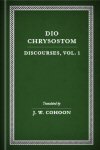
Dio Chrysostom, vol. 1
- Author: Dio Chrysostom
- Translator: J. W. Cohoon
- Series: Loeb Classical Library
- Publisher: Harvard University Press
- Publication Date: 1932
- Pages: 296
This volume contains:
- Introduction
- Discourses 1–11
- On Kingship I
- On Kingship II
- On Kingship III
- On Kingship IV
- A Libyan Myth
- Diogenes, or On Tyranny
- The Euboean Discourse
- On Virtue
- The Isthmian Discourse
- On Servants
- The Trojan Discourse
- Index
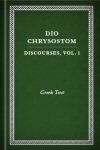
Dio Chrysostom, vol. 1: Greek Text
- Author: Dio Chrysostom
- Series: Loeb Classical Library
- Publisher: Harvard University Press
- Publication Date: 1932
- Pages: 296
This volume contains the Greek text of:
- Introduction
- Discourses 1–11
- On Kingship I
- On Kingship II
- On Kingship III
- On Kingship IV
- A Libyan Myth
- Diogenes, or On Tyranny
- The Euboean Discourse
- On Virtue
- The Isthmian Discourse
- On Servants
- The Trojan Discourse
- Index
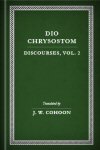
Dio Chrysostom, vol. 2
- Author: Dio Chrysostom
- Translator: J. W. Cohoon
- Series: Loeb Classical Library
- Publisher: Harvard University Press
- Publication Date: 1939
- Pages: 224
This volume contains:
- Discourses 12–30
- Man’s First Conception of God
- About His Banishment
- On Slavery and Freedom I
- On Slavery and Freedom II
- On Pain and Distress of Spirit
- On Covetousness
- On Training for Public Speaking
- On the Author’s Fondness for Listening
- On Retirement
- On Beauty
- Concerning Peace and War
- The Wise Man Is Happy
- On Happiness
- On the Guiding Spirit
- On Deliberation
- On Symposia
- Melancomas II
- Melancomas I
- Charidemus
- Index
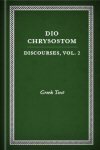
Dio Chrysostom, vol. 2: Greek Text
- Author: Dio Chrysostom
- Series: Loeb Classical Library
- Publisher: Harvard University Press
- Publication Date: 1939
- Pages: 224
This volume contains the Greek text of:
- Discourses 12–30
- Man’s First Conception of God
- About His Banishment
- On Slavery and Freedom I
- On Slavery and Freedom II
- On Pain and Distress of Spirit
- On Covetousness
- On Training for Public Speaking
- On the Author’s Fondness for Listening
- On Retirement
- On Beauty
- Concerning Peace and War
- The Wise Man Is Happy
- On Happiness
- On the Guiding Spirit
- On Deliberation
- On Symposia
- Melancomas II
- Melancomas I
- Charidemus
- Index
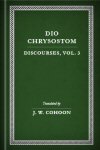
This volume contains:
- Discourses 31–36
- To the People of Rhodes
- To the People of Alexandria
- First Tarsic Discourse
- Second Tarsic Discourse
- Discourse Delivered in Celaenae in Phrygia
- Borysthenitic Discourse
- Index
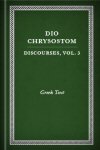
This volume contains the Greek text of:
- Discourses 31–36
- To the People of Rhodes
- To the People of Alexandria
- First Tarsic Discourse
- Second Tarsic Discourse
- Discourse Delivered in Celaenae in Phrygia
- Borysthenitic Discourse
- Index
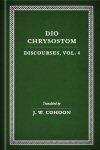
Dio Chrysostom, vol. 4
- Author: Dio Chrysostom
- Translator: H. Lamar Crosby
- Series: Loeb Classical Library
- Publisher: Harvard University Press
- Publication Date: 1946
- Pages: 250
This volume contains:
- Discourses 37–60
- The Corinthian Discourse
- To the Nicomedians, on Concord with the Nicaeans
- On Concord in Nicaea
- On Concord with Apameia
- To the Apameians, on Concord
- In His Native City
- A Political Address in His Native City
- An Address of Friendship for His Native Land
- In Defence of His Relations with Prusa
- A Protest against Mistreatment by His Fellow Citizens
- His Efforts to Beautify Prusa
- Index
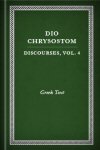
Dio Chrysostom, vol. 4: Greek Text
- Author: Dio Chrysostom
- Series: Loeb Classical Library
- Publisher: Harvard University Press
- Publication Date: 1946
- Pages: 250
This volume contains the Greek text of:
- Discourses 37–60
- The Corinthian Discourse
- To the Nicomedians, on Concord with the Nicaeans
- On Concord in Nicaea
- On Concord with Apameia
- To the Apameians, on Concord
- In His Native City
- A Political Address in His Native City
- An Address of Friendship for His Native Land
- In Defence of His Relations with Prusa
- A Protest against Mistreatment by His Fellow Citizens
- His Efforts to Beautify Prusa
- Index
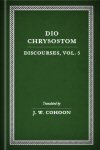
Dio Chrysostom, vol. 5
- Author: Dio Chrysostom
- Translator: H. Lamar Crosby
- Series: Loeb Classical Library
- Publisher: Harvard University Press
- Publication Date: 1951
- Pages: 266
This volume contains:
- Discourses 61–80
- Chryseis
- On Kingship and Tyranny
- On Fortune I
- On Fortune II
- On Fortune III
- On Reputation
- On Popular Opinion
- On Opinion
- On Virtue
- On Philosophy
- On the Philosopher
- On Personal Appearance
- On Trust
- On Distrust
- On Law
- On Custom
- On Envy
- On Wealth
- On Freedom
- Encomium on Hair
- Fragments
- Letters
- Testimony Regarding Dio’s Life and Writings
- Index
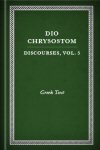
Dio Chrysostom, vol. 5: Greek Text
- Author: Dio Chrysostom
- Series: Loeb Classical Library
- Publisher: Harvard University Press
- Publication Date: 1951
- Pages: 266
This volume contains the Greek text of:
- Discourses 61–80
- Chryseis
- On Kingship and Tyranny
- On Fortune I
- On Fortune II
- On Fortune III
- On Reputation
- On Popular Opinion
- On Opinion
- On Virtue
- On Philosophy
- On the Philosopher
- On Personal Appearance
- On Trust
- On Distrust
- On Law
- On Custom
- On Envy
- On Wealth
- On Freedom
- Encomium on Hair
- Fragments
- Letters
- Testimony Regarding Dio’s Life and Writings
- Index
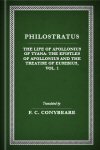
This volume contains F. C. Conybeare’s translations of books 1–5 of The Life of Apollonius of Tyana.
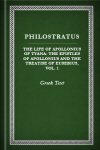
This volume contains the Greek texts of books 1–5 of The Life of Apollonius of Tyana.
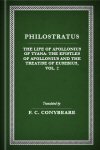
The Life of Apollonius of Tyana: The Epistles of Apollonius and the Treatise of Eusebius, vol. 2
- Author: Philostratus
- Translator: F. C. Conybeare
- Series: Loeb Classical Library
- Publisher: Macmillan Co.
- Publication Date: 1912
- Pages: 322
This volume contains books 6–8:
- The Life of Apollonius (continued)
- The Epistles of Apollonius
- The Treatise of Eusebius
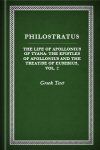
The Life of Apollonius of Tyana: The Epistles of Apollonius and the Treatise of Eusebius, vol. 2: Greek Text
- Author: Philostratus
- Series: Loeb Classical Library
- Publisher: Macmillan Co.
- Publication Date: 1912
- Pages: 322
This volume contains the Greek texts of books 6–8:
- The Life of Apollonius (continued)
- The Epistles of Apollonius
- The Treatise of Eusebius
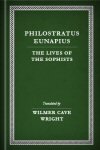
This volume contains:
- Philostratus: Lives of the Sophists
- Introduction
- Bibliography
- Text
- Preface
- Book I
- Book II
- Eunapius: Lives of Philosophers and Sophists
- Introduction
- Bibliography
- Text
- Glossary
- Index to Philostratus
- Index to Eunapius
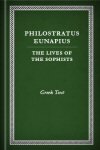
This volume contains the Greek texts of:
- Philostratus: Lives of the Sophists
- Introduction
- Bibliography
- Text
- Preface
- Book I
- Book II
- Eunapius: Lives of Philosophers and Sophists
- Introduction
- Bibliography
- Text
- Glossary
- Index to Philostratus
- Index to Eunapius
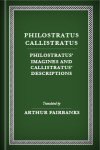
This volume contains:
- List of Descriptions
- List of Illustrations
- Bibliography
- Philostratus the Elder
- Introduction
- Imagines
- Book I
- Book II
- Philostratus the Younger
- Introduction
- Imagines
- Callistratus
- Introduction
- Descriptions
- Index
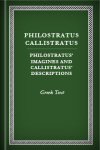
This volume contains the Greek texts of:
- List of Descriptions
- List of Illustrations
- Bibliography
- Philostratus the Elder
- Introduction
- Imagines
- Book I
- Book II
- Philostratus the Younger
- Introduction
- Imagines
- Callistratus
- Introduction
- Descriptions
- Index

The Letters
- Authors: Alciphron, Aelian, and Philostratus
- Translator: F. C. Conybeare
- Series: Loeb Classical Library
- Publisher: Harvard University Press
- Publication Date: 1949
- Pages: 304
This volume contains:
- Prefatory Note
- Abbreviations
- Alciphron
- Introduction
- Sigla
- The Letters
- Book I. Letters of Fishermen
- Book II. Letters of Farmers
- Book III. Letters of Parasites
- Book IV. Letters of Courtesans
- Index of Proper Names
- Greek Index
- Aelian
- Introduction
- Sigla
- Letters of Farmers
- Index of Proper Names
- Greek Index
- Philostratus
- Introduction
- Sigla
- Erotic Epistles
- Index of Proper Names
- Greek Index

The Letters: Greek Text
- Authors: Alciphron, Aelian, and Philostratus
- Series: Loeb Classical Library
- Publisher: Harvard University Press
- Publication Date: 1949
- Pages: 304
This volume contains the Greek texts of:
- Prefatory Note
- Abbreviations
- Alciphron
- Introduction
- Sigla
- The Letters
- Book I. Letters of Fishermen
- Book II. Letters of Farmers
- Book III. Letters of Parasites
- Book IV. Letters of Courtesans
- Index of Proper Names
- Greek Index
- Aelian
- Introduction
- Sigla
- Letters of Farmers
- Index of Proper Names
- Greek Index
- Philostratus
- Introduction
- Sigla
- Erotic Epistles
- Index of Proper Names
- Greek Index
About the Authors
Dio Chrysostom (40–120) of Bithynia began as a rhetorician who was hostile to philosophers, but after traveling to Rome, he converted to Stoicism. After voicing criticism of the emperor Dominitian, he was banned from Italy and Bithynia and spent the next 15 years traveling in poverty in the lands north of the Aegean. After a speech to the Greeks at Olympia in 97, he was welcomed back to Rome by the emporer Nerva and allowed to return to his homeland. His years of traveling and speaking in political circles are evident in his surviving Discourses.
Philostratus (172–250) was a Greek sophist who studied and taught in Athens and settled in Rome.
Eunapius was a Greek sophist and historian. He was born at Sardis in 347 and studied under Chrysanthius and Prohaeresius the rhetorician.
Callistratus was a minor Greek sophist of the third (or possibly fourth) century. His best-known work is Descriptions, in which he presents the details of 14 works of stone or brass by distinguished artists of the time.
Alciphron was a Greek sophist and eminent epistolographer.
Aelian was a Roman author and rhetorician who wrote primarily in Greek.
Reviews
1 rating